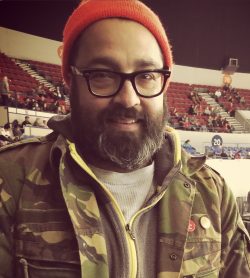 Hello! I’m Dr. Jonathan Ortiz, an instructor of Chicanx/Latinx Studies at PCC. I have been at the college since 2011, first as an adjunct and as a full-time faculty member since 2022. The courses I teach at PCC are both online and face-to-face.
Hello! I’m Dr. Jonathan Ortiz, an instructor of Chicanx/Latinx Studies at PCC. I have been at the college since 2011, first as an adjunct and as a full-time faculty member since 2022. The courses I teach at PCC are both online and face-to-face.
I am the son of an immigrant to the U.S. My mother and her family immigrated to the U.S. from Mexico. I want to extend a welcome to students who are immigrants, documented or undocumented, the children of immigrants, or the partners of immigrants.
I was born in East Los Angeles, but we moved to Seattle, Washington, when I was four, so I consider Seattle my hometown. I have been in Portland for over 20 years and cannot see myself leaving, but Seattle will forever be my home. In my classroom space, you will frequently hear me talk about how being raised in Seattle shaped my sense of self, specifically how my identity as Mexican, sometimes Chicano, and often Latino, was shaped by being raised without many other Latinos. I was lucky enough as a kid to spend my summers in Mexico with family, and that also shaped my sense of who I am as a Mexican.
I am a Cultural Anthropologist by training. I received my undergraduate degree in Anthropology and Spanish from Pacific Lutheran University and my doctorate in Cultural Anthropology from American University. The focus of my doctoral work was on prison inmates. I looked at the different ways the State works to shape the identities of the incarcerated, how class and race shape how inmates navigate the prison system, and how the experience of incarceration also shapes these identities. More recently, I have been researching the use of space, cities specifically. I am curious about how city space gets racialized and how neighborhoods gain or lose desirability based on who lives in certain areas. I am also interested in health disparities and how naturopathic and allopathic modalities can address these inequalities in health and illness.
As an anthropologist, Culture is something that interests me on a personal and professional level; I like to understand how people make sense of their lives and how we give meaning to the things we do. But since I’ve left graduate school, I have found myself using theory and methods from various fields, Sociology, Ethnic Studies, and History, to name a few. These disciplines all help me understand how the State uses its power to shape people’s lives and potentials and how we resist, acquiesce to, or otherwise engage with that power. I have found much to think about and apply to my analysis of the world in the ideas and theories provided by Critical Race Theory, Queer Theory, Joteria Studies, and Chicana Feminists. I dabble in Political Economy, and a bit of Post-Structuralism, and I have found the theories of Racial Formation central to my analysis of the world.
When I am not working, you can find me digging through crates at various record stores around town. I love finding new (to me) music to listen to, and I love going to live shows, too. If I am not buying or listening to records, you might find me complaining that I must go to the gym – a hobby I do not love. I try to be mindful of my yoga practice as well. When not doing these things, I am out with my family doing outdoorsy stuff. I also do some consulting around issues of equity, course design, and some guest speaking on health disparities in the U.S.
I am excited by Chicano/Latino Studies, and I try to get students to be as excited about it. To that end, I always try to be a better teacher and listener in my classroom. I have stopped trying to know everything, and I like to set out and see what interests us each term. My philosophy of teaching online or face-to-face is the same – I’m a facilitator. I want the material to be relevant to people’s lives, so I ask questions, pose problems, and work to get students to dig into the material and take control of it. Much of what we talk about impacts all Latinos in one way or another, and I work continuously to honor that in classroom spaces and my personal life.
